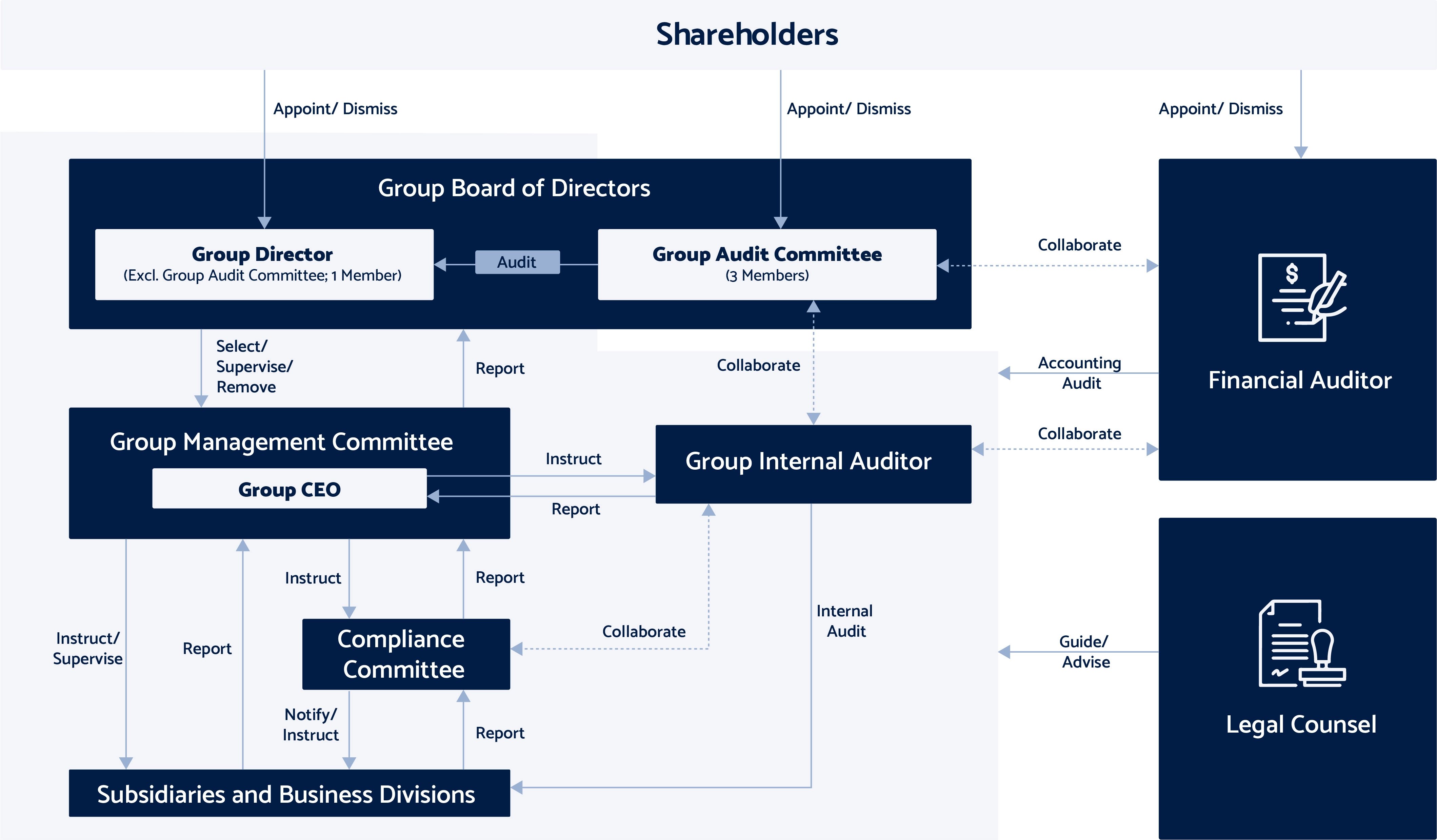
Corporate Governance
- Basic Policy
- Outline of the Corporate Governance System and Reasons for Adoption of the System
- Corporate Governance System
- Group Board of Directors
- Group Audit Committee
- Group Management Committee
- Compliance Committee
- Status of Independent Non-Executive Directors
- (1) Overview
- (2) Functions and Roles of Independent Non-Executive Directors in Corporate Governance
- Audit Status
- (1) Status of Group Audit Committee’s Audit
- (2) Internal Audit Status
- (3) Financial Audit Status
- (4) Mutual Collaboration among Group Audit Committee, Group Internal Auditor and Financial Auditor
YCP Group recognizes that effective corporate governance is essential for improving long-term corporate value, and thereby regards the strengthening and enhancement of corporate governance to be a key management issue. We believe that an environment in which corporate governance functions effectively will enable us to build good relationships with shareholders and other stakeholders, i.e. business partners, employees, etc., and to achieve long-term growth by providing quality services. As such, we disclose information in a timely and appropriate manner to ensure the soundness, transparency and objectivity of the YCP Group’s corporate activities as well as actively work towards creating a system that strengthens the YCP Group’s management supervision function.
To enhance management oversight functions of the Group Board of Directors, we have adopted the
governance
system of a company with an audit committee in accordance with the Companies Act of Japan. The Group
Board of
Directors consists of one (1) Director who is not a member of the Group Audit Committee and three
(3)
Directors who are members of the Group Audit Committee (out of which two (2) are Independent
Non-Executive
Directors (Statutory Audit and Supervisory Committee Members)). The Group Board of Directors meet
once a month
for regular Group Board Meetings or as and when necessary for Extraordinary Group Board Meetings to
enable
prompt and appropriate management and executive decision making.
The Group Audit Committee is composed of three (3) Directors (including two (2) Independent
Non-Executive
Directors (Statutory Audit and Supervisory Committee Members)) and is responsible for monitoring the
legality
and appropriateness of the Directors' business execution.
In addition to the Group Board Meeting, a Non-Executive Director who is a full-time Statutory Audit
and
Supervisory Committee member of the Group Audit Committee, also attends other meetings within the
Group where
he/she actively speaks from an independent standpoint based on his/her expertise and experience, and
inspect
important internal documents in daily audits to audit the lawfulness of the business operations. We
believe
that this system realizes fair and transparent management as well as ensures objectivity and
neutrality of the
management oversight function.
The image below outlines the corporate governance system of YCP Group.

The Group Board of Directors is composed of one (1) Executive Director who is the CEO of YCP
Group, and
three (3) Non-Executive Directors who are members of the Group Audit Committee. Of the
Non-Executive
Directors serving on the Group Audit Committee, two (2) Independent Non-Executive Directors
meet the
requirement for independent directors stipulated in the Companies Act of Japan.
The Group Board of Directors is chaired by the Group CEO. The Group Board of Directors meets
monthly for
regular meetings and as and when necessary for special meetings. Directors share information
and communicate with each other to make decisions on important business operations and
matters delegated by resolutions of shareholders meetings, as well as to supervise the
Group’s business operations and performance of duties of each Director.
The Group Audit Committee consists of three (3) Non-Executive Directors, and is chaired by a Non-Executive Director (full-time Statutory Audit and Supervisory Committee Member). The Committee meets monthly for regular meetings and as and when necessary. The Committee works with the Group Internal Auditor and external financial auditor, conducts audit and communicates with each other to make decision on important audit-related matters including financial reporting, risk management, and internal control matters.
The Group Management Committee is composed of one (1) Director (i.e. the Group CEO), who is not a member of the Group Audit Committee, and eight (8) Officers. The Committee meets regularly on a monthly basis and as and when necessary to discuss matters to be reported to or resolved by the Group Board of Directors in advance and to make management decisions on important matters related to business execution. The Group Management Committee meeting is chaired by the Group CEO.
To promote compliance, we have established the Compliance Committee chaired by the Group CEO. The Group COO is also appointed as the officer in charge of compliance, whereas the Legal and Compliance Group is appointed to manage and support for all compliance related matters of the Group in charge of compliance. The Compliance Committee designs YCP Group’s compliance policy and system for the Group Board of Directors to approve, develop compliance manuals, and conduct trainings to improve awareness and deepen knowledge on compliance.
The two (2) Independent Non-Executive Directors meet the requirements of an independent director under Singapore’s Corporate Governance Code, such as holding less than 10% of the Company’s shares or having no relationship with the Group Management that would prevent them from making independent management decisions and acting in the best interests of the Group.
An Independent Non-Executive Director plays an important role in corporate
governance where he/she
participates in the decision-making process, to confirm and advise on important
corporate decisions;
and to conduct effective oversight and supervision of the management team from a
broader and
independent perspective based on their background, knowledge, experience, etc. that
are different from
those within the Group. All of the Independent Non-Executive Directors of the
Company are members of
the Group Audit Committee, who perform necessary audits. Regarding the independence
of Independent
Non-Executive Directors, it is a requirement that there are no personal
relationships and/or business
relationships between the Directors and the Group. On capital relationships, there
should be no
conflict of interests between Directors and the Company, not only with its major
shareholders, but
also the general shareholders. The two (2) Independent Non-Executive Directors meet
the above
requirements, and hence independence is ensured.
Teng Theng Dar has been appointed as an Independent Non-Executive Director due to
his over 40 years of extensive experience and deep insight into entrepreneurship and
corporate management in Asia, Australia, and the Middle East Region, including a
Founding Chairman of Asia Entrepreneurs Exchange and Chief Executive Office of
Singapore Business Federation. There are no personal, capital, or business
relationships with the Group.
Satoko Kametaka, a lawyer registered in Japan and the State of New York, USA, has
been appointed as an Independent Non-Executive Director as she has specialist skills
and experience in M&A, private equity, finance, and other legal matters for global
companies. There are no personal, capital, or business relationships with the Group.
The Group Audit Committee consists of three (3) Non-Executive Directors who are members of the Group Audit Committee (out of which two (2) are Independent Non-Executive Directors). In order to conduct audits in alignment with the Internal Control System, the Group Audit Committee has established a system to confirm whether the Internal Control System is properly implemented and operated in accordance with the audit plan of the Group Audit Committee formulated every fiscal year, and to receive the audit reports on the audit results conducted by the Group Internal Auditor.
Internal audit of the Group is conducted under the supervision of the two (2) Group Internal Auditors who are employees of the Company, with the operational support of an external professional firm. The purpose of the internal audit is to verify and evaluate the effectiveness of the internal controls that we have developed and are operating to achieve the Group’s management objectives and ensure stable business operations, identify areas requiring improvement, and provide advice for improvements. The Director of the Group Internal Auditor conducts an internal audit with the approval of the Group CEO based on the internal audit plan formulated every fiscal year, reports the audit results of the respective audit components to the Group CEO, provides guidance for improvements on audit findings, and confirms the status of improvements.
Ernst & Young LLP has been appointed as the financial auditor. There are no special interests between the Group and Ernst & Young LLP as well as the executive members of Ernst & Young LLP.
The Group Audit Committee, the Group Internal Auditor, and the Financial Auditors hold regular meetings from the perspective of Three-Way Audit to share information and exchange opinions. Information may also be exchanged as and when necessary, and audits and supervision are performed in cooperation with each other.
Antisocial Forces Policy
YCP Holdings (Global) Limited and its subsidiaries declare the following basic policy on measures to deal with antisocial forces.
- We will have no relationships or dealings whatsoever with antisocial forces.
- We will never engage in backroom deals with antisocial forces to conceal any misconduct or provide funds or fringe benefits to antisocial forces.
- We will ensure the safety of our staff who deal with unjustified requests/demands by antisocial forces.
- We will establish close relationships with external experts, such as the police or Center for the Elimination of Boryokudan (Crime Syndicate), and take all appropriate action to reject and prevent any damages caused by antisocial forces.